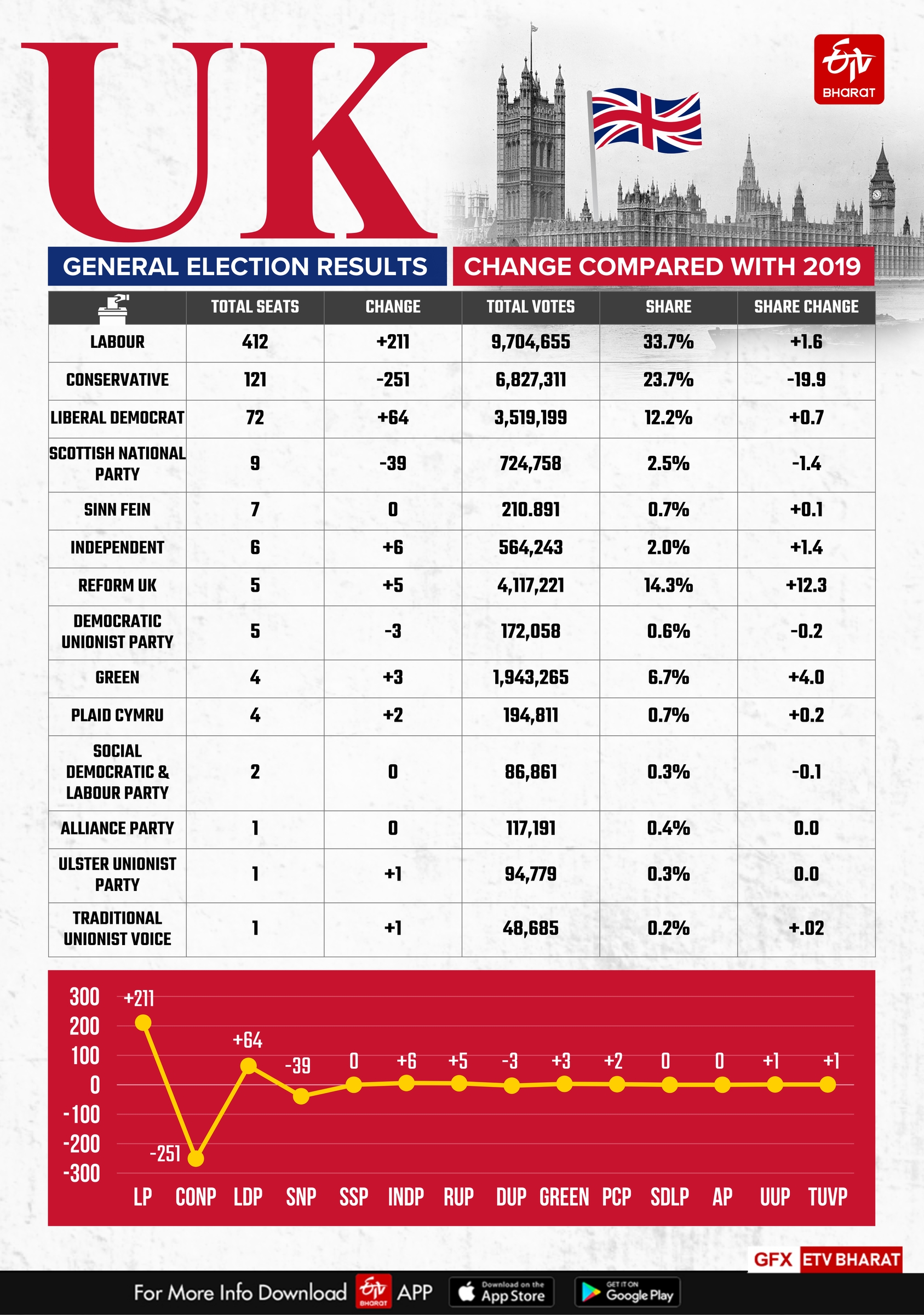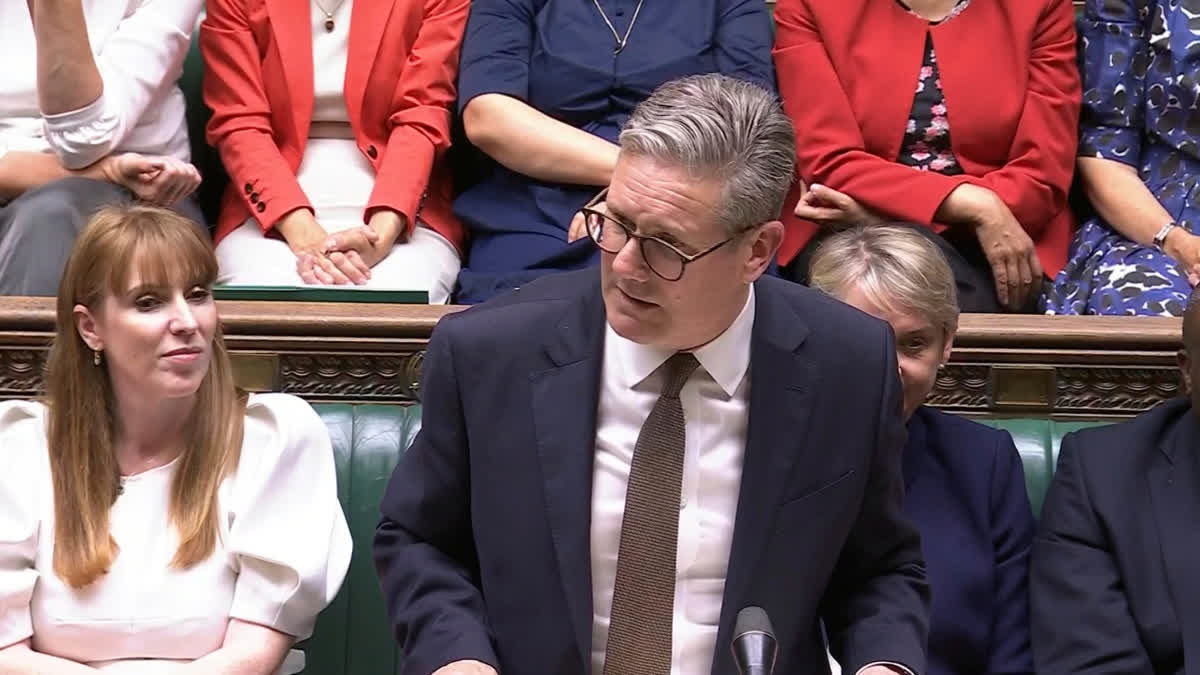The Labour Party has registered a spectacular electoral victory in the United Kingdom’s (UK) general elections. Out of the 650 Member of Parliament seats in the House of Commons, the Labour Party, under the leadership of Keir Starmer, won about 412 seats. The Labour Party is back in power after a 14-year gap, and the turnaround is being credited to Keir Starmer's leadership. Before taking over the leadership of the Labour Party, Keir Starmer worked as a human rights lawyer and Chief Prosecutor at the Crown Prosecution Service. In his first speech after taking over as the Prime Minister, Keir Starmer promised to work towards "national renewal and a return to the politics of public service."
Parties, Vote Share and Seat Share
While the Labour Party’s numbers in Parliament have improved significantly, the margins of victory were narrow in many constituencies. The Labour Party vote share in 2019 was around 32 per cent. This time around, Labour’s vote share increased marginally to 33.8 per cent, and it was able to win 63 per cent of seats in the Parliament.
On the other hand, the Conservative party’s voting percentage dropped dramatically from about 43 per cent in 2019 to 23.7 per cent. The Conservative Party won about 121 seats, and it lost about 244 seats that it held last time. Former Conservative Prime Minister Liz Truss, Defense Secretary Grant Shapps, and a host of other ministers lost the elections. Many in the Conservative Party attributed the electoral defeat to infighting, which was evident from the fact that in the past eight years, there were five Tory prime ministers. There was also an opinion that the inability to effectively address the core concerns, such as illegal immigration and inflation, promoted many conservative party voters to desert the party.

Many conservative party voters gravitated towards the Reform UK Party, which promised to dramatically reduce taxes, enforce strict border control to stop illegal migration and "stand up for British culture, identity and values." While the party won five seats, with a 14.3 per cent vote share, it came second in approximately 103 constituencies. The improved performance of the Reform UK Party is in consonance with the mood in European countries where many, anxious about migration, are voting for right-wing parties. Numerous news reports suggest that the conservative electoral performance would have been much better had the Reform UK Party not contested elections.
The Liberal Democrat Party has emerged as the third-largest party with 71 members of Parliament. It should be noted that the Liberal Democrat Party in 2019 won 11 seats with a vote share of around 11.5 per cent. In 2024, Liberal Democrat's vote share increased very marginally to about 12.2 per cent, but it ended up winning 71 seats. The fragmentation of the conservative vote and the votes received by the Reform Party enabled the Liberal Democrats to register impressive electoral victories.
A regional-level analysis shows interesting electoral results. In the northern part of the country, the Scottish National Party (SNP), which contested elections calling for the independence of Scotland, won about 9 Member of Parliament seats. Compared to 2019, the SNP lost about 39 seats. While the SNP’s agenda of independence of Scotland has taken a back seat for the moment, it will be tested again in the 2026 elections for the Scottish Parliament. On the other hand, the Labour Party, which won only one seat in 2019, this around won an impressive 37 seats in Scotland. In the Wales region, the conservative party did not win a single seat. In Northern Ireland, Sinn Fein won 7 Member of Parliament seats, and the Democratic Unionist Party won 5 seats.
Implications for India
In the new House of Commons, approximately 28 Members of Parliament are of Indian origin. While their election is a welcome development, it is not mandatory that the increased presence of people of Indian origin in the UK parliament will automatically result in better relations with India. The Indian-origin MPs will seek to advance British interests, rightly so, across the world. Further, they will have to factor in the preferences of their local vote banks in interactions with India.
In 2019, the Labour Party, under the leadership of Jeremy Corbyn, called for international intervention in Kashmir, which generated considerable dismay in India. However, after taking over the Labour Party’s leadership, Keir Starmer reportedly stated that "any constitutional issues in India are a matter for the Indian Parliament, and Kashmir is a bilateral issue for India and Pakistan to resolve peacefully."
Further, the recent Labour Party's manifesto promised to "seek a new strategic partnership with India, including a free trade agreement, as well as deepening cooperation in areas like security, education, technology, and climate change." For the United Kingdom, which has stepped out of the European Union, accessing the Indian market has acquired added urgency. Further, both countries share robust people-to-people interactions, educational ties, and security partnerships.
The Labour Party manifesto promised a United Kingdom-European Union security pact to meet common threats and greater collaboration with allies and friends. In the realm of non-traditional security, the Labour manifesto called for reform of multilateral institutions, a new Clean Power Alliance, and a partnership with the Global South for international development.
Conclusion
It is often said that a week is a long time in politics. The Conservative Party must overcome infighting to find new leadership and agenda. If it fails to do so, others, such as the Reform UK Party, will continue to take away the Conservative Party’s vote share.
Across Europe, right-wing parties are performing well in the elections. The election results in the United Kingdom suggest a similar anti-incumbency mood in the country. However, the presence of other parties, such as the Labour Party and the Liberal Democratic Party, has ensured that the anti-incumbency vote did not fully transfer into a vote for the right-wing parties. Nonetheless, the performance of the Reform UK Party should be noted. In the coming years, the politics of the Reform UK Party will attract considerable attention.
As in many countries with a First-Past-the-Post electoral system, there was a disconnect between the vote share and seat share of political parties in the recent UK election, which will once again generate considerable debate on the need for a proportional representation system in the UK. According to a Reuters report, the smaller parties received approximately 40 per cent of the vote but won just about 17 per cent of the seats in Parliament.
Therefore, it was not surprising that the Reform UK Party and the Green Party leaders have called for a "fairer electoral system." Over the years, the Liberal Democrats have been demanding a transition to a proportional representation model to ensure better vote share conversion into Parliament seats. In fact, a referendum was organised in 2011 to determine whether the country should adopt an alternate vote system. An overwhelming majority preferred to continue with the existing First-Past-the-Post electoral system. There are legitimate concerns that introducing proportional representation may exasperate identity politics and deepen societal divisions.
If we examine the change of seats between the parties, it would be tempting to term the election results in the United Kingdom as an electoral tsunami. However, if we examine the vote shares of parties, then the United Kingdom has witnessed gentle winds of change. For many liberal democratic countries across the world, a decisive electoral verdict and the prospect of stable government in the United Kingdom is a welcome development.
(Disclaimer: The opinions expressed in this article are those of the writer. The facts and opinions expressed here do not reflect the views of ETV Bharat)



